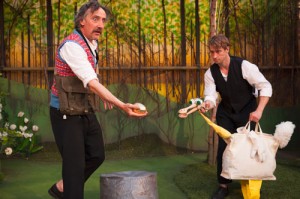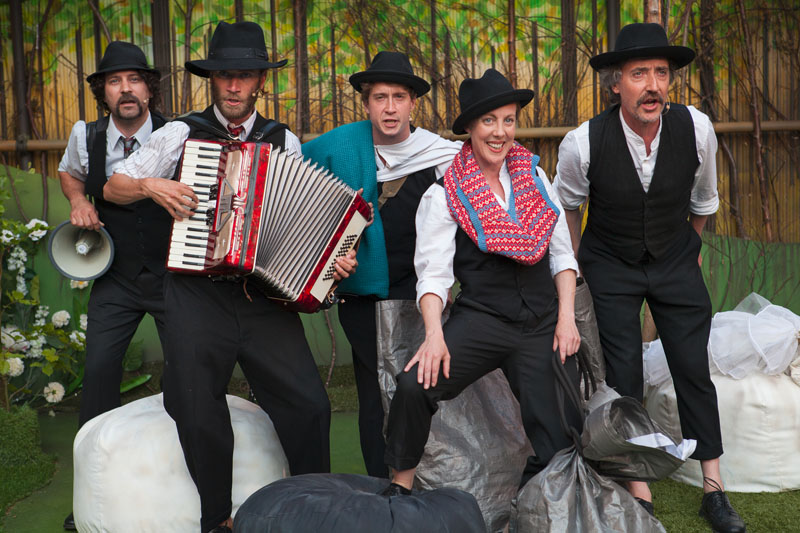Aesop’s Fables have been around for ever, almost literally. As though to establish that nothing ever changes, the lessons they teach us are always relevant, especially today. The glory of the stories is they probably have been saying that very same thing for the past two and a half thousand years. But we don’t want to get too serious, too soon.
The Boy Who Cried Wolf, based on the Michael Morpurgo adaptations, staged outdoors in a makeshift theatre on the pavement outside the Bristol Old Vic, is just one big bundle of fun. Or more accurately five bundles which double as bleeting sheep. But more of that later.
The Boy Who Cried Wolf, beautifully and cleverly directed by Sally Cookson, acts as an umbrella under and around which half-a-dozen or so of the fabulous fables are presented by a company of five performers. The three main actors are ably supported by two musicians, Benji and Will Bower, who are as adept in their multitude of guises as they are on their colourful selection of musical instruments, perched high in their eerie above the stage.
 It is impossible to pick out one of the three actors for special praise as they were all absolutely brilliant, so I’ll just mention a few of the bits I particularly enjoyed. Lucy Tuck had a cheeky, infectious grin and a rapport with the audience which made it difficult to take your eyes off her. But I think it was her portrayal of the tortoise that slowly but surely won the show. I would have thought that playing a tortoise was quite a tricky business, not least because it’s not the sort of thing they teach you in drama school. Nevertheless, Lucy was totally convincing and her munching of a lettuce leaf must set the bench mark for such characterisations for years to come. Also in the Tortoise and the Hare, Chris Bianchi excelled as a sort of Saturday Night Fever, long floppy-eared John Travolta who had all the moves, except one for winning.
It is impossible to pick out one of the three actors for special praise as they were all absolutely brilliant, so I’ll just mention a few of the bits I particularly enjoyed. Lucy Tuck had a cheeky, infectious grin and a rapport with the audience which made it difficult to take your eyes off her. But I think it was her portrayal of the tortoise that slowly but surely won the show. I would have thought that playing a tortoise was quite a tricky business, not least because it’s not the sort of thing they teach you in drama school. Nevertheless, Lucy was totally convincing and her munching of a lettuce leaf must set the bench mark for such characterisations for years to come. Also in the Tortoise and the Hare, Chris Bianchi excelled as a sort of Saturday Night Fever, long floppy-eared John Travolta who had all the moves, except one for winning.
Chris was equally wonderful as the gold-lamé jacketed Sun with Lucy as the frilly Wind competing to see who could disrobe the luckless traveller first. With his shades and hand-held microphone he was a cross between Elvis and Eric Idle. Lucy huffed and puffed but it was Chris’s dulcet tones that finally persuaded the hapless victim to shed his cloak and reveal all – only metaphorically, although he did feel the need to hide in the bushes afterwards. The moral, of course, was that friendly persuasion can be more effective than physical force.
But what of the boy who cried wolf? Tom Wainwright was excellent and suitably mischievous as the naughty, lying boy who proved that you can never believe a liar, even when he is telling the truth. As mentioned before, the sheep were initially represented, very convincingly, by half-a-dozen baaah-ing white beanbags – ohh, and a black one. There’s always a black one. The story is segmented and interspersed with the other tales. Very conveniently the sheep gradually got smaller and smaller in each episode until they were sufficiently bite-sized so they could be wolfed down by the … errr, wolf when he finally and scarily appeared.
I could go on all day but I think the other story I really want to highlight was The Goose that Laid the Golden Egg. Puppetry has finally been recognised as a true theatrical art form and this was powerfully demonstrated when a canvas shopping bag, two pairs of rubber gloves, a washing-up mop and a pair of wooden spoons became, before our very eyes, the feathered, web-footed harbinger of untold wealth – until its yellow-duster neck was cruelly wrung. Again Chris Bianchi excelled as the fortunate farmer who indulged himself in Ferraris and Caribbean holidays until his greed got the better of him and his daily fix of golden eggs was no longer enough.
All of the stories were brilliantly done and everyone was brilliant and very likeable, all the time. We were blessed with a beautiful hot summer evening but if/when it becomes damp and cloudy The Boy Who Cried Wolf will brighten and warm even the dullest day.
There are many important morals to be learned from Aesops Fables but I think the most significant and important to be learned from Bristol Old Vic’s The Boy Who Cried Wolf is that you can never do better than spending an evening in a theatre watching good, imaginative and innovative productions such as this.
I think we all came away with a glow, not only from the Pimms and summer heat but from the quality and warmth of the production – and hopefully a little wiser too. Oh, I should mention, kids will also like it. ★★★★★ Michael Hasted
Photos by Mark Douet
The Boy Who Cried Wolf at the Brsitol Old Vic 18th July – 1 September 2013


